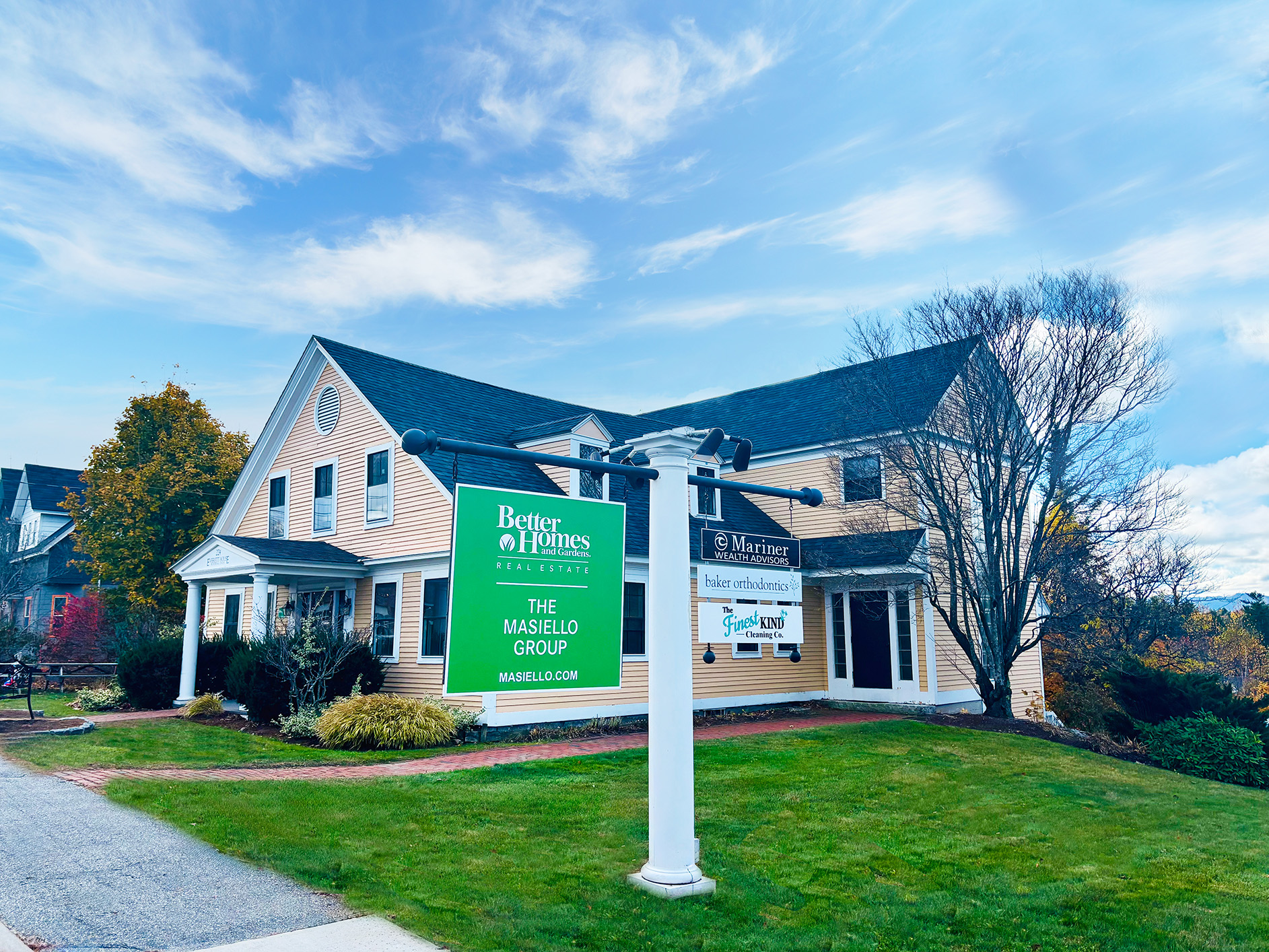
Since the announcement of the proposed settlement with the National Assoc. of Realtors (NAR), the media has erroneously made several claims about what it means for sellers and buyers. Below are some thoughts to help clarify.
- The settlement does not lower home prices. Home values are based on supply and demand - not what a seller pays for commission. Prices have increasingly gone up because there are fewer homes for sale and more buyers.
- There is no mandate on what Realtors can charge for their professional services. Commissions have always been negotiable. What will change is the offer of compensation to a buyer's agent can't be posted in the MLS.
- Sellers can elect not to pay buyer agent compensation. However, buyers may write into any offer a contingency requiring the seller to cover the cost or other concessions to compensate what they pay their buyer agent.
- Written buyer agency agreements will now be required for all Realtors working with buyers. NH has been requiring this for many, many years.
"This will be a time of adjustment, but the fundamentals remain: Buyers and sellers will continue to have many choices when deciding to buy or sell a home, and NAR members will continue to use their skill, care and diligence to protect the interest of their clients."
Contact me if you would like to work with a Realtor who will always look after your best interests and consistently stays on top of the changing real estate landscape.
 |
Donna ForestM: 603-731-5151donna@donnaforest.com Follow her on Facebook |

Photo Credit: Emma Bauso
Do More Families Equal Higher Taxes?
By: Donna Forest, Broker Associate
The lack of overall housing in our state is keeping prices higher and buyers on the sidelines, or even worse, leaving our state. We are seeing a significant housing crisis. Unfortunately, new construction is still playing catch up from the years of under building and many towns are reluctant to help address this major economic issue. Why? One of the reasons is a fear that housing for additional families will mean a higher property tax rate is needed to pay for public schools. Is this true? The answer is emphatically “NO”. Adding children to a school district does not equate to higher property taxes. This was proven in a 2019 study by Univ. of NH Professor Emeritus of Economics Robert England “Will More Kids in Town Raise the Local Tax Rate?” This report analyzed enrollment data from all 167 school districts from 2007 to 2017 and then compared the data to property tax figures during the same period. The results showed that changes in tax rates are not related to changes in public school enrollment and shouldn’t be used as a way to oppose new housing. Please bear this in mind as you consider how to keep your community viable and economically sound.
Follow Donna on Facebook!
#bhgmilestoneteam #bhgmilestone #bestteamintown #bhg #realtor #donnaforest

Real Estate Terms: What is the MLS?
The MLS, or Multiple Listing Service, is the database managed and maintained by the local board of REALTORS ®. When your agent lists your property, she inputs all the information into that database. The New Hampshire Association of Realtors ® syndicates that database to only certain providers – like Realtor.com. This is why when you search for property on Zillow and call your agent about it, she may tell you that property is no longer available. Even Realtor.com experiences a delay from the official MLS to what it shows as available or not. For example, if the listing agent marks the property in the MLS as under contract, it could take hours or longer for the syndicated sites to catch up with that update. When you want current listings, contact your agent, or visit her website for active listings. Your agent has direct access to the MLS and her website uses a database feed (called IDX) – she has the updates in real time. Or, if you can’t wait, use Realtor.com as your go-to public database.
And come back to The BHG Milestone Team blog to learn more helpful terms to enhance your real estate adventure!
#bhgmilestoneteam #bhgmilestone #bestteamintown #bhg #realtor
Photo by Towfiqu barbhuiya on Unsplash
Is Owning a Home a Good Investment?
The short answer is YES. According to House Logic and The BHG Milestone experts, owning a home has financial – and emotional – benefits! Consider:
- Long-term financial growth. Real estate appreciates!
- Building equity. From your downpayment to your mortgage payments (minus fees and interest), each dime adds to your home’s equity.
- Income tax advantages. The sale of your primary residence allows you (in most cases) to avoid tax on your profit ($250,000 for an individual; $500,000 for a couple).
- Additional itemized deductions. If you itemize your taxes, you can deduct property tax, some closing fees (like points), and mortgage interest!
- Fixed monthly payments. Your rent might (will) increase – but your mortgage payment is fixed.
- Improved credit score. Pay on time and reap the benefit!
- Your space – your castle. When you own your home, you can remodel and decorate any way you desire!
- Your sanctuary. Your home is your private sanctuary. It’s all yours!
#bhgmilestoneteam #bhgmilestone #bestteamintown #bhg #realtor
#buyahome #homefinancialbenefits

Photo by Towfiqu barbhuiya on Unsplash
Decoding Real Estate Terms: Property Value
What is your home worth?
We’ve been to that yard sale where we offer $5 for the rocking chair and the seller insists it’s an antique worth $50! (Which begs the question: Then why are you selling it out here on the lawn, in the rain?)
The same concepts apply to selling and buying real estate – and the industry has so many terms and ways to value a property, it can get confusing. Home value tools you find on the internet muddy the waters – although these tools are interesting, they are simple calculators that do not know the current, local market trends.
To better understand how to set and evaluate a property price, let’s look at those terms:
Fair Market Value: Arguably the most important valuation term to understand, fair market value is what a willing buyer would pay a willing seller. The definition makes it clear that willingness is inherent in the value: That the parties negotiate the price through an arm’s-length transaction, that the parties are aware of all the facts, that the parties are not pressured in any way.
For example: Mr. Smith offers Mr. Jones $200,000 for his home, and Mr. Jones counteroffers for $250,000, when Mr. Smith agrees, the fair market value is $250,000. Contrast that transaction with Mr. Smith offering his grandmother $50,000 for her house and she accepts (more akin to a gift than a negotiated sale on the market). Or, compare the first example with a short sale – where the buyer merely pays off the mortgage. That transaction does not reflect the market price at all! Fair market value is determined when the buyer freely makes an offer, and the seller freely accepts.
CMA: A CMA, or comparative market analysis, is the procedure real estate agents use to set the listing price for a home (or help a seller decide whether to sell). To perform the CMA, your agent researches the closing price – the fair market value - of similar, recently sold properties in your area. Read that again.
First, the listing price of local properties does not mean that is what a willing buyer will pay. And, often, enthusiastic sellers or agents will over-price a property – causing it to either sit on the market for far too long, not appraise for the listing price, or suffer price reduction after price reduction! Fair market value is only established when the deal closes.
Second, the agent uses properties that have sold recently – not last year! The recency is a good indication of current market conditions.
Third, the agent carefully selects the geographic area. What a house is worth in Manchester is not what it would be worth on Lake Sunapee!
Last, the agent will carefully identify properties as similar to your home’s features as possible: Number of bedrooms and bathrooms, square footage, condition, acreage, location to water, special features and characteristics, and so on. Also note, the agent will avoid using short sales, foreclosures, inherited or gifted properties in her analysis because those values do not reflect fair market value.
Appraisal: An appraisal is an authorized valuation of a property – an educated guess for what the fair market value could be. Similar to a CMA, an appraisal is completed by a licensed appraiser who analyzes the property using factors like location, condition, and resent sales of similar properties. Typically, appraisals are used for real estate, collectibles, or businesses to determine market value.
For example, your insurance company may want your sports cards appraised so it knows how much insurance you need to cover replacing the collection. Or an entrepreneur may need her business appraised so she can sell half to a new partner.
Often hired by the lender, the appraisal assures the lender it is not loaning too much for the property (that the property is enough collateral). For example, if the home appraises at $500,000, the lender will not want to loan $600,000.
Buyers also use appraisals to renegotiate contract terms. For example, if a buyer offered $500,000 and the appraiser determines the home is valued at $450,000, the buyer may attempt to reduce her offer. Whether or not she can do so will be clearly outlined in the sale contract. An expert real estate agent will consider the appraisal process when pricing and marketing your home.
Assessment: Assessed value is the value the tax authority uses to calculate property taxes. To determine that value, the tax assessor uses a type of appraisal which considers the fair market value, improvements, and the characteristics of similar properties.
But realize assessment happens irregularly – maybe every five or ten years. Fair market value can swing over that time. So, although the assessor uses fair market value, the assessment only hints at what fair market value was when the assessment was completed.
Assessed value is also adjusted for the character of the property – whether it is commercial, residential, the zone, and so on. Also, assessors often do not set the assessment at 100% of the estimated fair market value. And homeowners can appeal the regulator’s assessment – altering the assessed value. So, although buyers should investigate the assessment to determine how much property tax will be owed, the assessment does little to set or reflect the fair market value.
We hope this information helps you appreciate the value of your property. When you are ready to list or shop, contact The Best Team in Town to help you!
And, for more expert advice:

Photo by Alexander Grey on Unsplash
Part 2 of Our Two-Part Series:
In our April 3rd post, we gave you 5 ways to save for your home purchase down payment. Here are The Milestone Team’s second five tips to get you on the road to home ownership and your own special place in the world:
6. Make your savings work for you. Invest your down payment nest egg in a high-interest money-market or savings account. Avoid riskier investment (like stocks or crypto) so your principle is safe.
7. Start a side-hustle. Forbes recommends turning hobbies and passions into a side-business to earn additional income. You can also take a part-time job or…
8. Ask for a raise at work. The sooner you ask, the sooner you can save more for your new home.
9. Talk to a mortgage lender. Knowledge is power. Your local lender can offer steps and ideas so you can afford your dream home sooner. And…
10. Talk to your local real estate expert. Sure, you’re not buying your home today. However, you do not need to wait until you are shopping to engage your real estate agent. The Milestone Team members are experts and have the experience to help you save and shop wisely!
Don't forget for more expert advice to:

Photo by micheile henderson on Unsplash
Part 1 of Our Two-Part Series:
According to the National Association of Realtors, the most difficult step for buyers is saving for a down payment.
20% down is the market standard- although you may qualify for as little as 3.5% (FHA). It’s still a daunting challenge for many buyers to save even that 3.5% for a $300,000 purchase - which would amount to $10,500.
So, what do you do?
Here are The Milestone Team’s first five tips to get you on the road to home ownership and your own special place in the world:
- Create a vision board. Using a corkboard – or even your refrigerator! – display images of beautiful living spaces, décor you love, gardens you would want. The inspiration helps you prioritize saving for your special place versus spending impulsively.
- Get on a budget.Review and reduce your spending to maximize your monthly savings. Some ideas:
- Choose a “staycation:” Vacations can cost $2000 or more for a typical family. Check out local events, places to explore & stay, and put that extra cash towards your downpayment!
- Try a no-spend challenge. Each month, only spend on necessities and a few dollars for fun-money.
- Pay yourself first. Financial experts recommend “paying” yourself by setting aside 20% from each paycheck. Automate your savings by setting up an automatic transferwith your bank.
- Pay off debt. This seems counter-intuitive – “Shouldn’t I be saving every dollar towards my downpayment?” Every dollar that’s not costing you, yes. Paying off high-interest credit cards and auto loans not only saves you on interest each month, but also reduces your debt-to-income ratio and increases your credit score – which will help you qualify for your mortgage.
- Bank your next raise or tax refund. Yes, you really want that new flat screen television – but making the temporary sacrifice adds those extra funds to your down payment account!
Want more expert advice to save for your dream home? See our Part 2 later this month!

Wondering About Mortgage Rates & Home Prices?
Will Mortgage Rates Keep Rising?
The Federal Reserve is trying to lower inflation by increasing the federal fund rates and slow the economy. The Fed doesn’t set mortgage rates however their actions impact these rates. While inflation is high, we will see high mortgage rates. NAR Chief Economist, Lawrence Yun, says rates could continue to increase; adding that 7% looks to be the level the rest of this year and most of next year. He predicts within 2 yrs. the rate should return to 5.5%-6%.
Where are Home Prices Heading?
We continue to have more buyers than sellers in the market so it’s still a sellers’ market. The most recent NHAR report for October showed only a 1.7 month supply of homes to sell (a balanced market is 6 months). Some experts are calling for a little price appreciation next year and others project slight depreciation. Yun foresees zero or minor changes next year, with a swing in either direction. The overheated markets where prices shot up rapidly will see more of a shift in prices. In 2024 and beyond, the experts expect to see more normal appreciation (typically 3-4%) in the years ahead. Yun is predicting a 5% price jump in 2024. Pricing all depends on the local market and factors such as the balance between supply & demand. In NH thru Oct., prices are up 13.5% and homes sold 102.6% of the listing price.
If you are considering buying or selling, contact me for the best advice on making your next move.
Contact Donna Forest: 603-526-4116; www.DonnaForest.com; Donna@DonnaForest.com
You’ll be moving in the right direction with Better Homes & Gardens Real Estate - The Milestone Team
Top 5 Loan Killers
If you plan on getting a mortgage or have already started the loan process, you need to be extra cautious with your finances. Here are the top 5 show stoppers you should avoid.
- Purchasing large ticket items. Don’t buy a new car or even furniture until after the loan closes. New payments will impact how much money you can borrow or can even prevent you from qualifying for a loan.
- Paying late on bills. One 30-day late payment can subtract 80 to 110 points from your credit score. Many lenders require at least 12 consecutive months of on-time payments
- Shuffling money around. Lenders scrutinize all your bank statements as part of the approval process. Any unusual deposits or withdrawals will require clear documentation of what they are. A large sum of money transferred into an account right before closing could be lethal.
- Job changes. Taking on a new job can present some hurdles as lenders like stable income that will likely continue. Changing job fields or starting your own business will be a red flag.
- Getting a new credit card. Even something as simple as getting a Kohl’s credit card will impact your credit score.
Give me a call if you want to work with a Realtor who can help you avoid the common pitfalls when buying your dream home.

Contact Donna Forest: 603-526-4116; www.DonnaForest.com; Donna@DonnaForest.com
You’ll be moving in the right direction with Better Homes & Gardens Real Estate - The Milestone Team

A Recession Doesn’t Equal a Housing Crisis
Are you wondering how a recession affects the US housing market? Here are a few key points to help put some perspective on its impact.
- Interest rates go up at the beginning of a recession but are then lowered to stimulate the economy to move forward. Over the past 5 recessions, rates have fallen an avg. of 1.8% from the peak to the trough. Bear in mind interest rates will most likely rise until inflation peaks.
- Four out of the six times we were in a recession, home prices appreciated. They fell only twice – once marginally in the early 90’s and in 2008.
-
- The number of offers received on a home has dropped from an avg. of 5.5 offers in April to 4.2 in June. Still well above the pre-pandemic norm but this shows a moderating of the market.
-
- A month ago, 61% of offers were over asking and this has now softened to 55% over asking price on the avg. home sold. Not a huge decline but still a sign of the times.
-
- There is a slowdown in the pace of sales. It is looking more like it did in 2018 and 2019, which by the way, were great years for real estate.
-
- Active inventory is growing but there are still way more buyers than we have sellers. This will continue to put upward pressure on prices.
-
Whether buying or selling, contact me to make an informed decision on planning your next move.
 Donna Forest ~ donna@donnaforest.com ~ 603-731-5151
Donna Forest ~ donna@donnaforest.com ~ 603-731-5151
Real estate markets are local, and we have the real scoop on ours.




